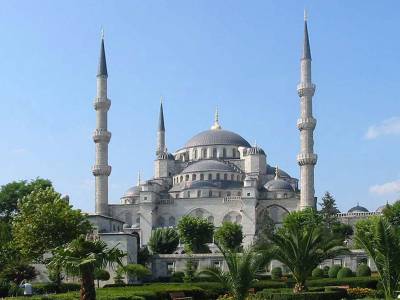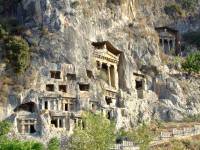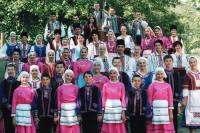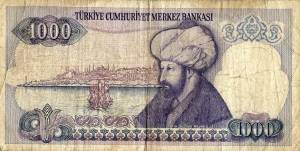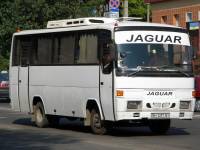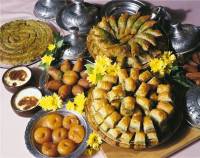Turkey
Turkey
- a land of extraordinarily beautiful nature, where the harsh mountains
alternate with broad valleys, "lunar" landscape of Cappadocia - with
crystal clear sea waters, superb sandy beaches - with the mysterious
ruins of bygone eras. Herodotus
claimed that did not exist in the world a more beautiful sky and the
sea coast than this krayu.Poberezhe Turkey is usually associated with
such historical figures such as Cleopatra and Alexander of Macedon, to
whom this place was the romantic ubezhischem.Turtsiya - a country with
centuries of history and ancient traditions. Favorable geographical position between Europe and Asia, Turkey has made a paradise for visitors from all over the world. 300
days a year, belong to lovers sunbathe, swim, enjoy a variety of
sports: surfing, water skiing, sailing, parachuting, and numerous
resorts with excellent hotels, beaches and soft sea have a comfortable
and pleasant stay.
Things to Do
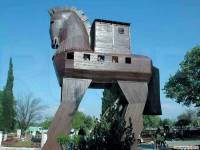
Turkey - is a wonderful paradise on earth ... Things begin with Turkey in Istanbul. Among the attractions of the city on two continents - the cathedral of Hagia Sophia, the Church Choir, underground palaces, water reservoirs, the remains of a Byzantine fortress, the mosque of Bayazid, Selim Ahmed, an archaeological museum with the sarcophagus of Alexander of Macedon, and others. This luxury Turkey - Topkapi Palace. This huge palace complex is truly a paradise of beauty was once a vital center Ottoman Empire. In the Topkapi - many fountains, gurgling streams, parks, pavilions, scenic tsvetnikov.Udivitelno is one of the wonders of the world - Pamukkale, which translates as "Cotton Castle". The white limestone terraces formed over thousands of years due to cooling of the hot sources of calcium are attracted lovers of beauty, and mineral water terraces have a beneficial effect on health, relieve tension and stress. On the shores of the Aegean and Mediterranean seas can meet all kinds of beaches, ranging from the vast sandy beaches to rocky coves and small thoughtful. Water quality is of the category "very good" or "excellent."
Culture and Art
Due to its unique geographical position between East and West, Turkey has for centuries absorbed the best of the crop in the Middle East, Islam and the Mediterranean. As one of the oldest settlements in the world, Anatolia, which became home to many different people, has a rare cultural raznoobraziem.Kultura Turkey is manifested in its museums. Turkish museums are decorated with subtle color tiles, graceful glass vases, carved wooden doors, mosques glitters illuminated Koran, loose lay tangled jewelry and luxury kostyumy.Literatura music and the Ottoman Empire were mostly religious in nature, and their sounds pompous and unfamiliar to European ears. pride of place in world culture is philosophical poetry of Yunus Emre and Rumi Jelaleddin, a role model are architectural masterpieces of Sinan.
Nature and climate
Republic of Turkey (Turkiye Cumhuriyeti) is located in Western Asia and parts of Southern Europe, bordering the Black Sea in the north, the south - the Mediterranean Sea to the west - Aegean morem.Ploschad countries 814 578 kv.km.Prirodnye conditions extremely diverse: from the glaciers and snow-capped peaks to the arid steppes. In the spring, on the border of winter and summer tourist seasons, you can dash off plenty of skiing, the evening of that day to spend on the shore is quite warm and caressing sea ... In Istanbul, the climate is mild, the sky is often overcast (average temperature in January - to + 3 to 9 ° C in August - from 20 to 29 ° C, water temperature - 23 ° C). It is interesting to note that geographically, Istanbul is on the same latitude as Naples, Lisbon and Beijing, and the Mediterranean coast of the country - at the latitude of Tokyo, Seoul and San Frantsisko.Klimat inner Anatolia - continental, with hot dry summers and cold snowy winters (in Ankara, the average January temperature ranges from -5 to +4 ° C, and in August - from 16 to 31 ° C). The average January temperature in Ankara is between -4 ° C to 4 ° C, the average temperature in July - 15 ° C to 30 ° C. On the west coast the climate is warm and wet (in Izmir, the average temperature in January - from 6 to 13 ° C in August - from 21 to 33 ° C, water temperature - 23 ° C) . On the south coast the climate is warm, you can swim from April to October (in Antalya, the average temperature in January - from 6 to 15 ° C in August - from 23 to 34 ° C, water temperature - 27 ° C). Heavy - hot and humid summers typical of the Mediterranean coast between Mersin and Antalya (up to 45 ° C). The least rain falls from May to October (except for the Black Sea coast).
Polity and Languages
Polity - respublika.Glava state - Ahmed Necdet Sezer (Ahmed Necdet Sezer). He 10th president of Turkey, and was elected to the 2000g.Glava Government - Prime Minister Bulent Ecevit (in office from 1999 year). The official language in Turkey is Turkish. In different regions and in the course of the Kurdish and arabskiy.V cities and tourist centers are also used: English, German, French. Where are regularly Russian, you can hear the general expressions of the native Russian language.
History
The Turkish state arose in Asia Minor in the late 13th - early 14th centuries. As a result of wars of conquest 14 - 16 centuries. there was a vast Ottoman Empire. The national liberation struggle of the peoples who inhabited it, and the Russian-Turkish wars in the 19th century. led to a significant reduction in the territory of the empire, the creation of independent states. By the late 19th - early 20th centuries. Turkey fell into economic dependence on European powers. The bourgeois-democratic revolution in 1908 led to the overthrow of Sultan Abdul Hamid II and the establishment of a constitutional monarchy, but did not lead to a change in the existing feudal order. After the defeat of Turkey in the First World War, the Entente began to split not only the territory of the collapsed Ottoman Empire, but Turkey itself. Under these conditions, as well as under the influence of the Russian revolution unfolded in the country, the national liberation struggle - Kemalist revolution under the leadership of the party Kemal (Ataturk), which ended in victory for Turkey and the declaration of 29.10.1923, the Republic of Turkey. In the 20 - 30s were conducted economic reforms. In 1923, Ataturk (president in 1923 - 1938.) Was created by the People's Republican Party (in power until 1950). During the Second World War, Turkey declared neutrality, but tacitly supported Nazi Germany. In 1949, joined NATO. In 1960, a coup that led to the adoption of a new constitution, strengthen political life. In 1974, the troops occupied the northern part of Cyprus, populated mainly by Turks, was created by none other than the Turkish government, not recognized by the State of North Cyprus. After the military coup in 1980, the parliament and political parties were disbanded in power was the military administration. In December 1983, there was a return to civilian rule. From 1983 to 1987 was conducted the process of market oriented economic reforms that have led the country to economic recovery. But in the late 80s at the general global economic downturn fledgling national economy received a serious blow: There was hyperinflation, high unemployment rate. Beginning in 1950, the first phase of economic reforms, the situation in the regions inhabited by Kurds, was sharply deteriorate. Kurdistan - one of the most underdeveloped agricultural regions of Turkey: the introduction of new economic structures led to rejection of the majority of the Kurds. Spontaneously began to emerge acts of violence and unrest. In 1978 he founded the Kurdish Workers Party (PKK) - the party founded on the ideas of nationalism and socialism. Since 1983, the party began military operations in the Turkish and Iraqi Kurdistan, proclaiming the goal of creating an independent state. Estimate of the number of its combat troops ranged from 5 000 to 10 000. It is funded by the Kurds living abroad, Syria, and from illicit drug and arms trafficking. In 1991, with the establishment of the United States and Britain, the security zone in northern Iraq, the PKK has received an additional springboard to expand the fighting. The Turkish government responded with an increase in the number of troops in the south-east of the country to 200 thousand people. and application of artillery and air strikes against bases of the RCP in Iraq. It is estimated between 1982 and 1995. in the Kurdish-Turkish conflict killed about 15 thousand people., most of them Kurds. In the late 1980s and 1990s in Turkey strengthened the ideas of Islamic fundamentalism, which is reflected in the balance of power in parliament and the election of the prime minister of a representative of fundamentalist parties. The Army remains committed to a secular way of development of the country and continues to play an important role in political life in Turkey.
Holidays and weekend
January 1: New god23 April: Day of National nezavisimosti19 May: Day of Youth and sporta30 August: Day pobedy29 October: Day of the Republic - the main state prazdnik10 November: the day of death of Kemal Ataturk - the father of the Turkish Republic. At 9:05 Turkish citizens give a posthumous honor its first president. All silent for a moment, on the streets stopped traffic - there are passers-by, honking cars. If you are in any way you respect other people's traditions, you will also have to honor the "father of Turks" minute molchaniya.10 January - 8 February: Ramadan, the holy month. During Ramadan devout Muslims do not eat or drink from sunrise to sunset. Many restaurants open at this time just after sunset. In some areas of Turkey - especially away from the resort towns - not even a Muslim at risk of incurring the universal condemnation, if at all to eat, drink and even smoke just before the muezzin call on all night molitvu9 February-11 February: Seker Bairam, or the "feast of sugar." This holiday Fitr, which marks the end of the 27-day fasting in Ramadan. Lasts 3 dnya17 April April 21: Eid al Adha, or "Feast of Sacrifice," begins the 10th of the month of Dhu al-Hijjah. This is a major Muslim holiday, which symbolizes the act of confirming their commitment to Islam. This act is performed by the faithful sacrifice. It also coincides with the completion ceremony of the annual pilgrimage to Mekku.Sheker Bayram and Kurban Bayram is an official holiday in Turkey. At this time, all state agencies, as well as shops, banks, museums, etc. are closed for at least three days.
Customs regulations
By some estimates, the Turkish customs among the top ten European customs, and therefore unnecessary delays in legitimate border crossing you have not dolzhno.Krome personal items are allowed to carry no more than two cameras, a radio, a typewriter, a film camera, etc. VCRs, televisions, jewelry and other valuables should be given in the customs declaration. In addition, the tourist may bring in duty free in Turkey up to 1 kg of coffee, 5 liters of alcoholic beverages rather weak, and 1 liter of beverage strength above 22 degrees, 20 packs of cigarettes or 50 cigars. To import foreign currency, as well as native lyre, it is possible without any restrictions. However, remove the Turkish lira is allowed only in an amount not exceeding $ 1,000 equivalent. Dollars can be brought out at around 10 000. Requires special attention paperwork required for cross-border transportation of pets. Need to take care of special veterinary certificate and do not forget to assure her of the Turkish consulate. The tourist can take out personal items and gifts - only 70 kg of baggage and 20 kg of hand luggage. For excess weight will have to pay extra. Valuable items can be exported from the country if they were registered in the passport holder to enter or if they were purchased on the exchanged currency (need help). The export of weapons, drugs, antiques. If you purchased the carpet, in order to smuggle it through customs, you must provide a certificate of purchase, as well as a certificate of a museum, which would confirm that this is not an antique rug.
Money, currency exchange
The monetary unit of Turkey - Turkish Lira (International Classification of currencies designated as TRL, a numerical code - 792). In circulation are banknotes of 20 million, 5 million, 1 000 000 500 000 250 000 100 000 50 000 20 000 10 000 5000 lire. Banknote of 20 million lira banknote is the largest in the world, although it is worth only about 10 lira dollarov.Kurs constantly fluctuating and generally prone to high inflation, so before coming into the country to buy the Turkish lira has no meaning. They can be significantly cheaper, before you have time to use them. It is best to bring cash in U.S. dollars or euros - almost anywhere they are accepted as legal tender along with lyres. Also highly rated and German marks. In general, it is not necessary to change large amounts of currency to the native money, although a small amount of pounds to carry it is still necessary, because many things in Turkey are less than one dollar (for example, a trip on a bus or a can of beer), and the change from the dollar to lira you likely to be given to unprofitable kursu.Snyat money from a plastic card, usually not too difficult, especially in tourist areas. The most common credit cards: Express, Eurocard, Diner's Club, Visa, Mastercard. Heavier than the cash traveler's checks. In this case you can help such companies as American Express or Thomas Cook
Transport
Bus - the most popular means of communication within Turkey. The average ticket price in town - 200 thousand Turkish liras - 0.5 U.S. dollar. Taxi - the average price for 1 km - 1.5 U.S. $ (payable to the taximeter). At night time (GECE) - from 24.00 to 6.00 is a double tariff. Route taxis - work from 6.00 am to 24.00 fixed-price fares. In smaller towns, such as Belek traffic ends at about 20.00.
Shopping
Cheap leather, cotton, gold jewelry, goods made of onyx and copper, have made Turkey one of the most attractive countries for purchases. In addition, non-fixed prices for goods allow tourists to bargain with prodavtsami.Harakternye products: Turkey offers a large selection of electronics, gold, clothes, household goods, perfumes and cosmetics. In the fifteenth century is of great importance was attached to the ceramic and pottery. And today you can see the decorative plates and vases, relating to that period. Well-developed manufacturing utensils of copper and zinc. Everywhere you can find traditional dishes, trays, grinders, various pipes, green or golden vases of onyx, cotton shirts and capes. Istanbul - Grand Bazaar, or Covered Market (Kapali Carsi Kapali charm) - the most famous and largest of the Turkish bazaars, its territory is situated about 4000 magazinov.V new port of Antalya is "free trade zone." Here you are able to make purchases free of duties and taxes. This free market which accepts all monetary units and checks, open only to foreigners, so do not forget your passport at the hotel.
Useful phone numbers
Emergency numbers: Police - 155 Ambulance - 112 Fire - 110 Supplemental - 118 Postal Information - 161.
Toilets
In Turkey, as in any other country, toilets are located in airports, railway and bus stations, cinemas, museums, restaurants, bars, etc. WC denotes a sign saying BAY (ERKEK) - for muchzhin, BAYAN (KADIN) - for women.
Tips
Tips are given to the porters (within $ 1), the waiters - 10% of the cost of lunch. Tipping taxi drivers is not accepted.
Religion
The most common religion in Turkey is Islam, 98% of the population - Muslims. The remaining 2% are Catholic, Protestant, Jewish and Christian Orthodox.
Medicine
Insurance is optional, but recommended that you buy health insurance, provision for medical care abroad, including the evacuation of patients by air if necessary. In the absence of insurance you may require on-site medical services to pay cash, so because medical care is paid, qualified doctors are usually only in big cities. Telephone medical emergencies - 112. Despite the fact that the epidemic situation in Turkey is generally pretty quiet, in some cases, the recommended vaccination against hepatitis A and B. The tap water is generally safe to drink, because through the process of chlorination. However, it is best to use fresh water, packed in butylkah.Na Turkish pharmacy - eczane (edzhane). Typically, pharmacies are open from Monday to Saturday from 9.00 to 19.00. In every city there is also a duty pharmacy, which operates around the clock, seven days a week. On duty pharmacies, and pharmacy background - 011.
Population
The population of Turkey (estimated for 1999) amounts to about 65,599,206 million, an average population density of about 82 people per square kilometer. km. The highest density in Istanbul and the coastal regions. Annual growth rate - about 1.57% 60% of the population lives in gorodahEtnicheskie groups: Turkish 80%, Kurds - 17%, Greeks, Arabs, Armenians and Jews.
Visas
Citizens of Ukraine, Belarus and Russia in advance to make out the visa is not required - you can buy it at the border or at the airport in the Turkish tamozhne.Vizovaya brand sold on the boundary, gives the right to multiple entry into the country for 2 months and costs $ 20 ( for both adults and children). If you're going to take place in the country for more than 2 months in advance, you should contact the Turkish Embassy.
Food
Thanks to the huge variety of products and culinary skills of Turkish, Turkish cuisine leaves few people indifferent ... Snacks (meze - meze) and salads (solata - salad), a variety of delicious and that it is possible to eat them alone. Typically, the waiter brings a tray of appetizers to choose from.
Things to Do

Turkey - is a wonderful paradise on earth ... Things begin with Turkey in Istanbul. Among the attractions of the city on two continents - the cathedral of Hagia Sophia, the Church Choir, underground palaces, water reservoirs, the remains of a Byzantine fortress, the mosque of Bayazid, Selim Ahmed, an archaeological museum with the sarcophagus of Alexander of Macedon, and others. This luxury Turkey - Topkapi Palace. This huge palace complex is truly a paradise of beauty was once a vital center Ottoman Empire. In the Topkapi - many fountains, gurgling streams, parks, pavilions, scenic tsvetnikov.Udivitelno is one of the wonders of the world - Pamukkale, which translates as "Cotton Castle". The white limestone terraces formed over thousands of years due to cooling of the hot sources of calcium are attracted lovers of beauty, and mineral water terraces have a beneficial effect on health, relieve tension and stress. On the shores of the Aegean and Mediterranean seas can meet all kinds of beaches, ranging from the vast sandy beaches to rocky coves and small thoughtful. Water quality is of the category "very good" or "excellent."
Culture and Art
Due to its unique geographical position between East and West, Turkey has for centuries absorbed the best of the crop in the Middle East, Islam and the Mediterranean. As one of the oldest settlements in the world, Anatolia, which became home to many different people, has a rare cultural raznoobraziem.Kultura Turkey is manifested in its museums. Turkish museums are decorated with subtle color tiles, graceful glass vases, carved wooden doors, mosques glitters illuminated Koran, loose lay tangled jewelry and luxury kostyumy.Literatura music and the Ottoman Empire were mostly religious in nature, and their sounds pompous and unfamiliar to European ears. pride of place in world culture is philosophical poetry of Yunus Emre and Rumi Jelaleddin, a role model are architectural masterpieces of Sinan.
Nature and climate
Republic of Turkey (Turkiye Cumhuriyeti) is located in Western Asia and parts of Southern Europe, bordering the Black Sea in the north, the south - the Mediterranean Sea to the west - Aegean morem.Ploschad countries 814 578 kv.km.Prirodnye conditions extremely diverse: from the glaciers and snow-capped peaks to the arid steppes. In the spring, on the border of winter and summer tourist seasons, you can dash off plenty of skiing, the evening of that day to spend on the shore is quite warm and caressing sea ... In Istanbul, the climate is mild, the sky is often overcast (average temperature in January - to + 3 to 9 ° C in August - from 20 to 29 ° C, water temperature - 23 ° C). It is interesting to note that geographically, Istanbul is on the same latitude as Naples, Lisbon and Beijing, and the Mediterranean coast of the country - at the latitude of Tokyo, Seoul and San Frantsisko.Klimat inner Anatolia - continental, with hot dry summers and cold snowy winters (in Ankara, the average January temperature ranges from -5 to +4 ° C, and in August - from 16 to 31 ° C). The average January temperature in Ankara is between -4 ° C to 4 ° C, the average temperature in July - 15 ° C to 30 ° C. On the west coast the climate is warm and wet (in Izmir, the average temperature in January - from 6 to 13 ° C in August - from 21 to 33 ° C, water temperature - 23 ° C) . On the south coast the climate is warm, you can swim from April to October (in Antalya, the average temperature in January - from 6 to 15 ° C in August - from 23 to 34 ° C, water temperature - 27 ° C). Heavy - hot and humid summers typical of the Mediterranean coast between Mersin and Antalya (up to 45 ° C). The least rain falls from May to October (except for the Black Sea coast).
Polity and Languages
Polity - respublika.Glava state - Ahmed Necdet Sezer (Ahmed Necdet Sezer). He 10th president of Turkey, and was elected to the 2000g.Glava Government - Prime Minister Bulent Ecevit (in office from 1999 year). The official language in Turkey is Turkish. In different regions and in the course of the Kurdish and arabskiy.V cities and tourist centers are also used: English, German, French. Where are regularly Russian, you can hear the general expressions of the native Russian language.
History
The Turkish state arose in Asia Minor in the late 13th - early 14th centuries. As a result of wars of conquest 14 - 16 centuries. there was a vast Ottoman Empire. The national liberation struggle of the peoples who inhabited it, and the Russian-Turkish wars in the 19th century. led to a significant reduction in the territory of the empire, the creation of independent states. By the late 19th - early 20th centuries. Turkey fell into economic dependence on European powers. The bourgeois-democratic revolution in 1908 led to the overthrow of Sultan Abdul Hamid II and the establishment of a constitutional monarchy, but did not lead to a change in the existing feudal order. After the defeat of Turkey in the First World War, the Entente began to split not only the territory of the collapsed Ottoman Empire, but Turkey itself. Under these conditions, as well as under the influence of the Russian revolution unfolded in the country, the national liberation struggle - Kemalist revolution under the leadership of the party Kemal (Ataturk), which ended in victory for Turkey and the declaration of 29.10.1923, the Republic of Turkey. In the 20 - 30s were conducted economic reforms. In 1923, Ataturk (president in 1923 - 1938.) Was created by the People's Republican Party (in power until 1950). During the Second World War, Turkey declared neutrality, but tacitly supported Nazi Germany. In 1949, joined NATO. In 1960, a coup that led to the adoption of a new constitution, strengthen political life. In 1974, the troops occupied the northern part of Cyprus, populated mainly by Turks, was created by none other than the Turkish government, not recognized by the State of North Cyprus. After the military coup in 1980, the parliament and political parties were disbanded in power was the military administration. In December 1983, there was a return to civilian rule. From 1983 to 1987 was conducted the process of market oriented economic reforms that have led the country to economic recovery. But in the late 80s at the general global economic downturn fledgling national economy received a serious blow: There was hyperinflation, high unemployment rate. Beginning in 1950, the first phase of economic reforms, the situation in the regions inhabited by Kurds, was sharply deteriorate. Kurdistan - one of the most underdeveloped agricultural regions of Turkey: the introduction of new economic structures led to rejection of the majority of the Kurds. Spontaneously began to emerge acts of violence and unrest. In 1978 he founded the Kurdish Workers Party (PKK) - the party founded on the ideas of nationalism and socialism. Since 1983, the party began military operations in the Turkish and Iraqi Kurdistan, proclaiming the goal of creating an independent state. Estimate of the number of its combat troops ranged from 5 000 to 10 000. It is funded by the Kurds living abroad, Syria, and from illicit drug and arms trafficking. In 1991, with the establishment of the United States and Britain, the security zone in northern Iraq, the PKK has received an additional springboard to expand the fighting. The Turkish government responded with an increase in the number of troops in the south-east of the country to 200 thousand people. and application of artillery and air strikes against bases of the RCP in Iraq. It is estimated between 1982 and 1995. in the Kurdish-Turkish conflict killed about 15 thousand people., most of them Kurds. In the late 1980s and 1990s in Turkey strengthened the ideas of Islamic fundamentalism, which is reflected in the balance of power in parliament and the election of the prime minister of a representative of fundamentalist parties. The Army remains committed to a secular way of development of the country and continues to play an important role in political life in Turkey.
Holidays and weekend
January 1: New god23 April: Day of National nezavisimosti19 May: Day of Youth and sporta30 August: Day pobedy29 October: Day of the Republic - the main state prazdnik10 November: the day of death of Kemal Ataturk - the father of the Turkish Republic. At 9:05 Turkish citizens give a posthumous honor its first president. All silent for a moment, on the streets stopped traffic - there are passers-by, honking cars. If you are in any way you respect other people's traditions, you will also have to honor the "father of Turks" minute molchaniya.10 January - 8 February: Ramadan, the holy month. During Ramadan devout Muslims do not eat or drink from sunrise to sunset. Many restaurants open at this time just after sunset. In some areas of Turkey - especially away from the resort towns - not even a Muslim at risk of incurring the universal condemnation, if at all to eat, drink and even smoke just before the muezzin call on all night molitvu9 February-11 February: Seker Bairam, or the "feast of sugar." This holiday Fitr, which marks the end of the 27-day fasting in Ramadan. Lasts 3 dnya17 April April 21: Eid al Adha, or "Feast of Sacrifice," begins the 10th of the month of Dhu al-Hijjah. This is a major Muslim holiday, which symbolizes the act of confirming their commitment to Islam. This act is performed by the faithful sacrifice. It also coincides with the completion ceremony of the annual pilgrimage to Mekku.Sheker Bayram and Kurban Bayram is an official holiday in Turkey. At this time, all state agencies, as well as shops, banks, museums, etc. are closed for at least three days.
Customs regulations
By some estimates, the Turkish customs among the top ten European customs, and therefore unnecessary delays in legitimate border crossing you have not dolzhno.Krome personal items are allowed to carry no more than two cameras, a radio, a typewriter, a film camera, etc. VCRs, televisions, jewelry and other valuables should be given in the customs declaration. In addition, the tourist may bring in duty free in Turkey up to 1 kg of coffee, 5 liters of alcoholic beverages rather weak, and 1 liter of beverage strength above 22 degrees, 20 packs of cigarettes or 50 cigars. To import foreign currency, as well as native lyre, it is possible without any restrictions. However, remove the Turkish lira is allowed only in an amount not exceeding $ 1,000 equivalent. Dollars can be brought out at around 10 000. Requires special attention paperwork required for cross-border transportation of pets. Need to take care of special veterinary certificate and do not forget to assure her of the Turkish consulate. The tourist can take out personal items and gifts - only 70 kg of baggage and 20 kg of hand luggage. For excess weight will have to pay extra. Valuable items can be exported from the country if they were registered in the passport holder to enter or if they were purchased on the exchanged currency (need help). The export of weapons, drugs, antiques. If you purchased the carpet, in order to smuggle it through customs, you must provide a certificate of purchase, as well as a certificate of a museum, which would confirm that this is not an antique rug.
Money, currency exchange
The monetary unit of Turkey - Turkish Lira (International Classification of currencies designated as TRL, a numerical code - 792). In circulation are banknotes of 20 million, 5 million, 1 000 000 500 000 250 000 100 000 50 000 20 000 10 000 5000 lire. Banknote of 20 million lira banknote is the largest in the world, although it is worth only about 10 lira dollarov.Kurs constantly fluctuating and generally prone to high inflation, so before coming into the country to buy the Turkish lira has no meaning. They can be significantly cheaper, before you have time to use them. It is best to bring cash in U.S. dollars or euros - almost anywhere they are accepted as legal tender along with lyres. Also highly rated and German marks. In general, it is not necessary to change large amounts of currency to the native money, although a small amount of pounds to carry it is still necessary, because many things in Turkey are less than one dollar (for example, a trip on a bus or a can of beer), and the change from the dollar to lira you likely to be given to unprofitable kursu.Snyat money from a plastic card, usually not too difficult, especially in tourist areas. The most common credit cards: Express, Eurocard, Diner's Club, Visa, Mastercard. Heavier than the cash traveler's checks. In this case you can help such companies as American Express or Thomas Cook
Transport
Shopping
Cheap leather, cotton, gold jewelry, goods made of onyx and copper, have made Turkey one of the most attractive countries for purchases. In addition, non-fixed prices for goods allow tourists to bargain with prodavtsami.Harakternye products: Turkey offers a large selection of electronics, gold, clothes, household goods, perfumes and cosmetics. In the fifteenth century is of great importance was attached to the ceramic and pottery. And today you can see the decorative plates and vases, relating to that period. Well-developed manufacturing utensils of copper and zinc. Everywhere you can find traditional dishes, trays, grinders, various pipes, green or golden vases of onyx, cotton shirts and capes. Istanbul - Grand Bazaar, or Covered Market (Kapali Carsi Kapali charm) - the most famous and largest of the Turkish bazaars, its territory is situated about 4000 magazinov.V new port of Antalya is "free trade zone." Here you are able to make purchases free of duties and taxes. This free market which accepts all monetary units and checks, open only to foreigners, so do not forget your passport at the hotel.
Useful phone numbers
Emergency numbers: Police - 155 Ambulance - 112 Fire - 110 Supplemental - 118 Postal Information - 161.
Toilets
In Turkey, as in any other country, toilets are located in airports, railway and bus stations, cinemas, museums, restaurants, bars, etc. WC denotes a sign saying BAY (ERKEK) - for muchzhin, BAYAN (KADIN) - for women.
Tips
Tips are given to the porters (within $ 1), the waiters - 10% of the cost of lunch. Tipping taxi drivers is not accepted.
Religion
The most common religion in Turkey is Islam, 98% of the population - Muslims. The remaining 2% are Catholic, Protestant, Jewish and Christian Orthodox.
Medicine
Insurance is optional, but recommended that you buy health insurance, provision for medical care abroad, including the evacuation of patients by air if necessary. In the absence of insurance you may require on-site medical services to pay cash, so because medical care is paid, qualified doctors are usually only in big cities. Telephone medical emergencies - 112. Despite the fact that the epidemic situation in Turkey is generally pretty quiet, in some cases, the recommended vaccination against hepatitis A and B. The tap water is generally safe to drink, because through the process of chlorination. However, it is best to use fresh water, packed in butylkah.Na Turkish pharmacy - eczane (edzhane). Typically, pharmacies are open from Monday to Saturday from 9.00 to 19.00. In every city there is also a duty pharmacy, which operates around the clock, seven days a week. On duty pharmacies, and pharmacy background - 011.
Population
The population of Turkey (estimated for 1999) amounts to about 65,599,206 million, an average population density of about 82 people per square kilometer. km. The highest density in Istanbul and the coastal regions. Annual growth rate - about 1.57% 60% of the population lives in gorodahEtnicheskie groups: Turkish 80%, Kurds - 17%, Greeks, Arabs, Armenians and Jews.
Visas
Citizens of Ukraine, Belarus and Russia in advance to make out the visa is not required - you can buy it at the border or at the airport in the Turkish tamozhne.Vizovaya brand sold on the boundary, gives the right to multiple entry into the country for 2 months and costs $ 20 ( for both adults and children). If you're going to take place in the country for more than 2 months in advance, you should contact the Turkish Embassy.
Food
Thanks to the huge variety of products and culinary skills of Turkish, Turkish cuisine leaves few people indifferent ... Snacks (meze - meze) and salads (solata - salad), a variety of delicious and that it is possible to eat them alone. Typically, the waiter brings a tray of appetizers to choose from.
